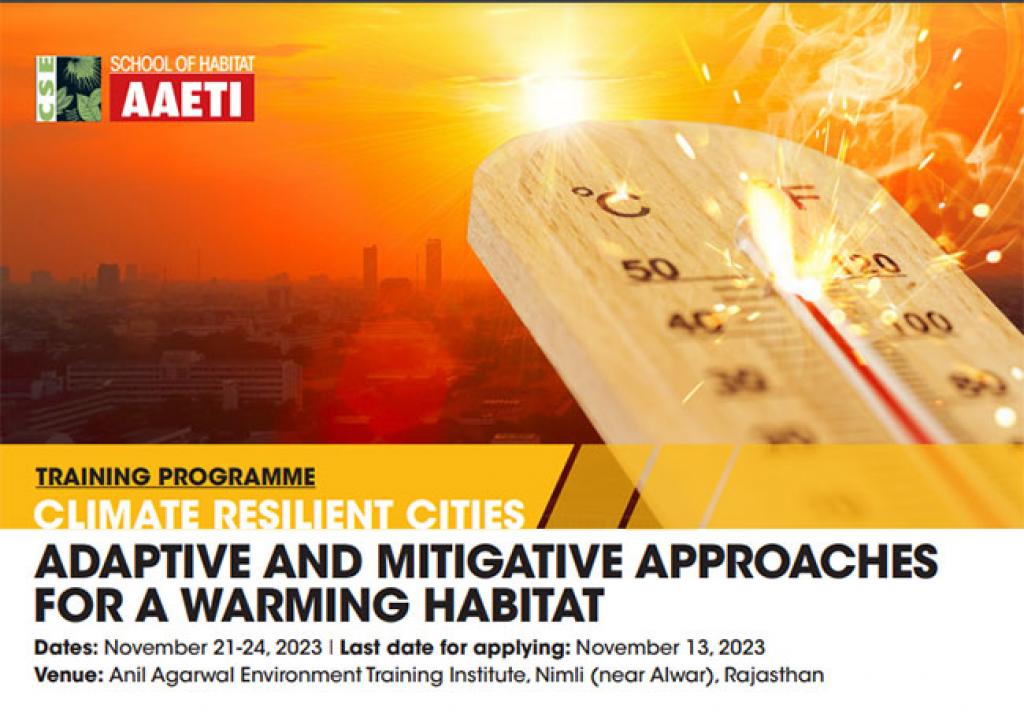CLIMATE-RESILIENT CITIES: Adaptive and Mitigative Approaches for a Warming Habitat : CSE

![]()
Last date to apply 13th Nov 23 / Course Date: 21 – 24 Nov 2023 / Venue: Rajasthan
The Centre for Science and Environment (CSE) is a public interest research and advocacy organisation based in New Delhi. CSE researches into, lobbies for and communicates the urgency of development that is both sustainable and equitable. The scenario today demands using knowledge to bring about change. In other words, working India’s democracy. This is what we aim to do.The challenge, we see, is two-pronged. On the one hand, millions live within a biomass based subsistence economy, at the margins of survival. The environment is their only natural asset. But a degraded environment means stress on land, water and forest resources for survival. It means increasing destitution and poverty. Here, opportunity to bring about change is enormous.But it will need a commitment to reform – structural reform- in the way we do business with local communities. On the other hand, rapid industrialization is throwing up new problems: growing toxification and a costly disease burden. The answers will be in reinventing the growth model of the Western world for ourselves, so that we can leapfrog technology choices and find new ways of building wealth that will not cost us the earth. Our aim is to raise these concerns, participate in seeking answers and in pushing for answers, transforming these into policy and so practice. We do this through our research and by communicating our understanding through our publications.
Cities face immense vulnerability in the wake of climate change, with far-reaching consequences for infrastructure, lives and environmental well-being. A United Nations report warns that at 1.5°C warming, 2.3 billion people could suffer severe heat waves. The report also predicts a potential 4°C rise in warming in cities by century-end if greenhouse gas emissions persist at current levels.
Elevated temperatures in cities can pose challenges such as heat-related illnesses, increased cooling energy demands, water shortages, and economic consequences. The dire situation is exacerbated by concretisation, shrinking of green spaces and waterbodies, lifestyle changes, and a shift towards air conditioning and cars.
There is an urgent need to tackle cities’ heat-related challenges with the help of adaptive and mitigative measures. This can be done through modification of bye-laws, strategic planning, innovative building design, harnessing solar potential in buildings and public spaces, and integration of sustainable cooling systems, among others. These measures can play a key role in safeguarding public health, enhancing urban liveability, building resilience to climate change, and contributing to national climate goals.
Centre for Science and Environment (CSE) is offering a four-day training programme that will provide participants with holistic knowledge for designing climate-resilient and resource-efficient urban habitats. It will capture how better layout planning, optimisation of using green and blue infrastructure, incorporation of energy-efficient low-carbon techniques, transitioning towards renewable energy, and appropriate building design can — together — contribute to an enhanced urban environment and the overall well-being/liveability of its occupants.
Course Fee
Rs 28,000* (sponsorships and discounts available) *Course fee will cover tuition fee, and costs of training materials, boarding and lodging, and transport from New Delhi to AAETI and back.
Who can Apply
This training programme is designed for officials from urban local bodies and other government departments, architects, planner, engineers, builders and developers, researchers and scholars.
PROGRAMME HIGHLIGHTS
- Urban habitat and climate change
- Understanding the drivers of heat gain, reductions, sources and sinks in an urban form
- Urban heat island effect
- Leveraging remote sensing (RS) and Geographic Information Systems (GIS) for urban climate studies
- Low-carbon and renewable cooling technologies
- Potential of solar energy for decarbonisation
- Role of electric vehicles in shaping the future
- State climate action plans
- Vulnerability assessment and risk mapping
- Energy Conservation Building Codes
COURSE COORDINATOR
Nimish Gupta
Deputy Programme Manager
Sustainable Habitat Programme, CSE
9056225889
nimish.gupta@cseindia.org
COURSE DIRECTOR
Rajneesh Sareen
Programme Director
Sustainable Habitat Programme, CSE
rajneesh.sareen@cseindia.org

